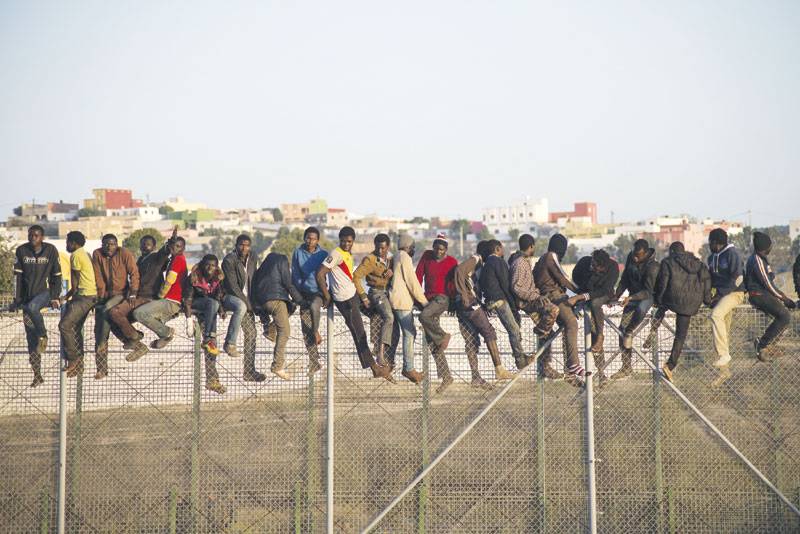Roland LLOYD PARRY - Each travelled more than 2,000 miles, Abou from impoverished Ivory Coast and Mahmud from Syria after militants besieged his hometown.
Each of them made it into Europe the only way he knew how: by land, past the fiercely guarded fence that closes off the Spanish city of Melilla from northern Morocco. Abou Diarrisso is still on a high days after scrambling over the six-metre border fence and dodging Spanish guards.
Standing outside Melilla’s immigrant centre, where those who make it into this enclave wait to hear whether they can stay in Europe, they tell two very different stories.
“We eat well here. Everything we need, they give us. This is the first time since I was born that I have felt good,” said Diarrisso, a lean 22-year-old, smiling in a woolly hat and blue tracksuit top. But Mahmud Sheikho, a primary school teacher in his twenties, is tearful and traumatised. He didn’t choose to come.
“Life in this city is not good,” he said. “The bathroom is very bad and the beds are not good. We are now in winter. The beds are not good for winter.”
Feeling welcome
Like thousands of other Africans, Diarrisso camped out in the woods on Mount Gurugu, the mountain overlooking the border to Melilla. There he waited for a “chief” elected by the migrants to choose the moment for an attempt on the fence.
One night last month, Diarrisso and 200 companions crept through the dark for two hours and hid in a cemetery near the fence until Moroccan soldiers noticed them. “The chief said, it’s now or never: strike! I hid my telephone in my underpants. I attached hooks to my hands. Everyone yelled: Let’s go! And 200 of us charged at the fence.”
Before reaching it, they swam through a ditch, then vaulted a barrier of barbed wire. Abou shows the marks on his hands and heels where it cut him.
As scores of his companions failed in the climb or got caught by guards, he scrambled over one layer of the fence and then the second. “You have to be strong and very fit. You have to be a lion!” he said.
“I felt dizzy but I could see Melilla before me. Just one fence from my aim. I managed to get over by myself. I was in Europe - my aim for the past two years,” he said. “There were 200 of us to start with. I was the only one to get over the fences and enjoy victory.”
The last obstacle was the Spanish military police at the border. “When I hit the ground the guards were after me. I saw a puddle so I went and lay down in the water. I passed out. I vomited and pissed on myself.”
But he escaped the hunt. By morning he had found his way to the immigrant centre. “If I find a good job in Spain I’d like to stay here. I’ll marry a Spanish woman if I have to. Spain is a good country. It is a country that welcomes people and helps them.”
Euphoria to trauma
Nearly 20,000 migrants have stormed the fence this year and 2,000 have made it across, according to the Spanish government. Dozens of migrants and police have been injured.
“Those who climb the fence tend to get cuts and bruises. Then we monitor their psychological state,” said Enrique Roldan, a spokesman for the Red Cross in Melilla.
“When they come to Melilla they feel euphoric because they have achieved their aim, but as the days go by, that euphoria decreases,” he said. “In many cases we see symptoms of post-traumatic stress caused by hardship or the things they have experienced on the journey.”
Mahmud Sheikho, a Kurd from the Syrian border town of Kobane, grimaces and struggles for words to describe how he got to Melilla.
The softly-spoken teacher fled after militants of the group calling itself Islamic State (IS) laid siege to his town. “IS attacked us and all the people in Kobane left together for Turkey. Many of us stayed at the Turkish border, without eating, without sleeping, in the streets for 10 days or more.”
From Turkey, he and a group of companions managed to fly to Algeria and from there to neighbouring Morocco and Melilla, completing part of the journey on foot.
After several failed attempts and setbacks with the Moroccan authorities, they made it into Melilla by paying 1,000 euros ($1,200) each for fake Moroccan passports. His stay in Melilla’s immigrant centre is one step on a journey of exile that he hopes will take him to Germany. “I suffered to get here,” he says.
Tuesday, April 16, 2024
Crossing the fence: desperate migrants’ paths to Europe

Decision to retaliate against Iran attacks rests with Israel, says Pentagon
1:05 PM | April 16, 2024
Global brands facing challenge from local contenders in Pakistan's FMCG market
10:24 AM | April 16, 2024
Israeli Air Force finalizes preparations for possible attack on Iran
8:21 AM | April 16, 2024
Court remands XEN in FIA custody
April 16, 2024
Political Reconciliation
April 16, 2024
Pricing Pressures
April 16, 2024
Western Hypocrisy
April 16, 2024
Policing Reforms
April 15, 2024
Storm Safety
April 15, 2024
Democratic harmony
April 16, 2024
Digital dilemma
April 16, 2024
Classroom crisis
April 16, 2024
Bridging gaps
April 16, 2024
Suicide awareness
April 15, 2024
ePaper - Nawaiwaqt
Advertisement
Nawaiwaqt Group | Copyright © 2024





